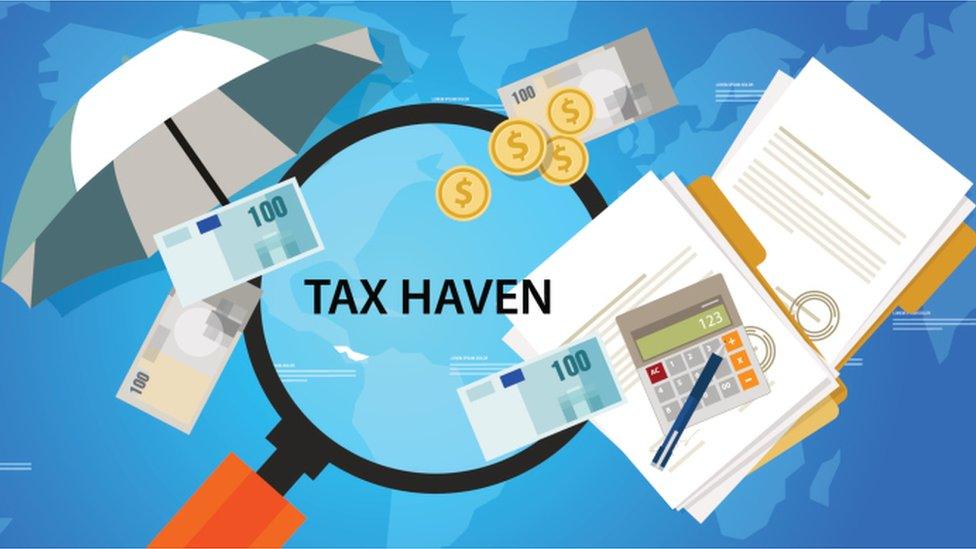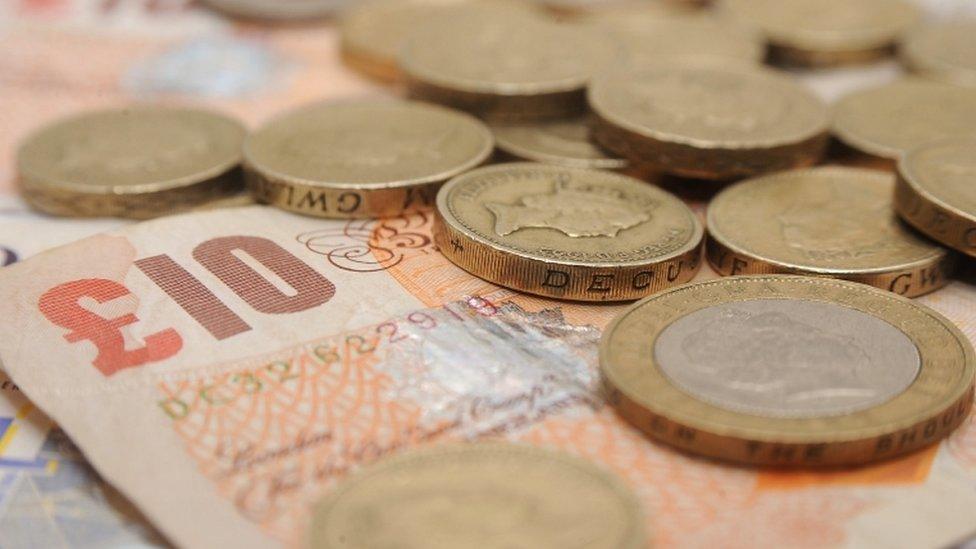Dodgy tax: who are the big losers?
- Published

The Panama Papers are offering up much evidence of what was long suspected. Those with accountants and without scruples can stash their wealth away - where the sun shines, but the taxman's searchlight doesn't.
Now, following the leak of the Mossack Fonseca files, the arc lights of publicity are being shone harshly on those, including Britain's prime minister, who appear to have benefited from funds being invested in offshore, low-tax jurisdictions.
It may be legal, but the court of public opinion is indignant and moralistic in its judgement.
Those Panamanian files are not the start. Corporate tax avoidance - or "planning" - has also been put under a much brighter spotlight in recent years.
Some of the giants that dominate the digital marketplace have felt the heat from public opinion, including their customers, who don't like what they're learning. It's put some people right off their Starbucks coffee.
While tax revenue is scarce, and public services squeezed, the British public understandably want to see the corporate elite, as well as the wealthy, picking up more of the cost of supporting the society from which they benefit.
Asset plunder
But there's another way of looking at it. Viewed from much of the developing world, Britain is a tax haven. In addition, it does very nicely out of providing financial advice and services to minimise tax bills around the world.
Hundreds of billions of pounds-worth of tax revenue that could be going into the public services of developing nations moves into Britain, Ireland, Luxembourg and other relatively low-tax jurisdictions.
This has become one of the main campaigning planks for poverty campaign groups such as Christian Aid and Oxfam. It is also enthusiastically pursued by the "rich country club" of the OECD (Organisation for Economic Co-operation and Development).
They cite figures from the United Nations conference on trade and development (UNCTAD), published last year. It estimates multi-national corporations pay around $220bn in tax on corporate profits, but use offshore tax loopholes to avoid paying another $100bn.
So it's nearly a third gets disappeared. That's in addition to the plunder of assets by individuals, who send their money out of country.

The UK is seen as a significant part of that problem. Some economists reckon that a shakedown of the system would not only hit the British Virgin Islands, but Britain itself, as a net loser if there were a transition to a genuinely fair taxation regime around the world.
For developing countries, the tax base tends to be weak, in that few individuals have significant income and wealth. Business taxation is therefore more important to them.
The UNCTAD study showed that the average developed country relies on corporate taxation for 5% of tax. For developing countries, even without the tax lost to multi-nationals placing their taxable income offshore, the share is double that. In Africa, it is 14%.
So when corporate tax is lost, through multi-national companies transferring profit to lower-tax countries, that loads more weight on to the remaining tax payers.
It is unfair on smaller companies that do not trade across borders (also true of smaller companies in Britain).
And there is a risk that it erodes confidence in the system. The respect for law and HMRC authority in Britain is not shared everywhere. Where taxes are dodged by some, and enforcement is weak, payment of tax quickly comes to be seen as optional.

Anti-poverty groups are working together in campaigns to change corporate behaviour on tax - to encourage companies to see tax payment as a responsibility, but also in their own interests.
They argue that the good corporate citizen, as with the good individual one, sees tax payment as the price for supporting a stable, law-abiding, prosperous society from which all that income and wealth is derived. It might even be seen as an investment in society.
Since the financial crash brought the wheels off last decade's money-making juggernaut, there has been more questioning of whether the legal construct of a company is suited to society's needs.
Its mission, defined by statute, legal judgement and convention, is to maximise shareholder value, which can have a destructive effect on societies, workers, justice, human rights and the environment.
B-Corp
So there is growing interest in re-defining companies, and directing them to a more nuanced set of priorities. Using legislation passed in most of the states of the USA over the past six years, the "Benefit Corporation" or B-Corp, is one which legally registers as having more on its mind than maximising shareholder value. It has to demonstrate how well it's achieving those other objectives.
Italy and Australia are following. Worldwide, 1,600 companies have been certified as B-Corps. Since autumn, a British campaign office has been seeking recruits, with 79 already signed up, ranging across 12 sectors.
It may not add much to what's already in place. You might argue that the social enterprise movement in Britain is already well down that road, or that the Community Interest Company, an entity created by a 2005 Westminster law, is ahead of America's B-Corp.
It is probably easier to define a company's social or environmental mission from start-up. But converting an existing, conventional company to a Benefit Corporation is a tough sell to boardrooms and to investors.
Institutional funds are mostly required to maximise shareholder value as well. And the B-Corp's credit rating is more complex to calculate.
This is a big challenge to a factor that runs deep and across societies - the desire first to be financially secure, and then to maximise wealth. The latter is sometimes also known as greed.